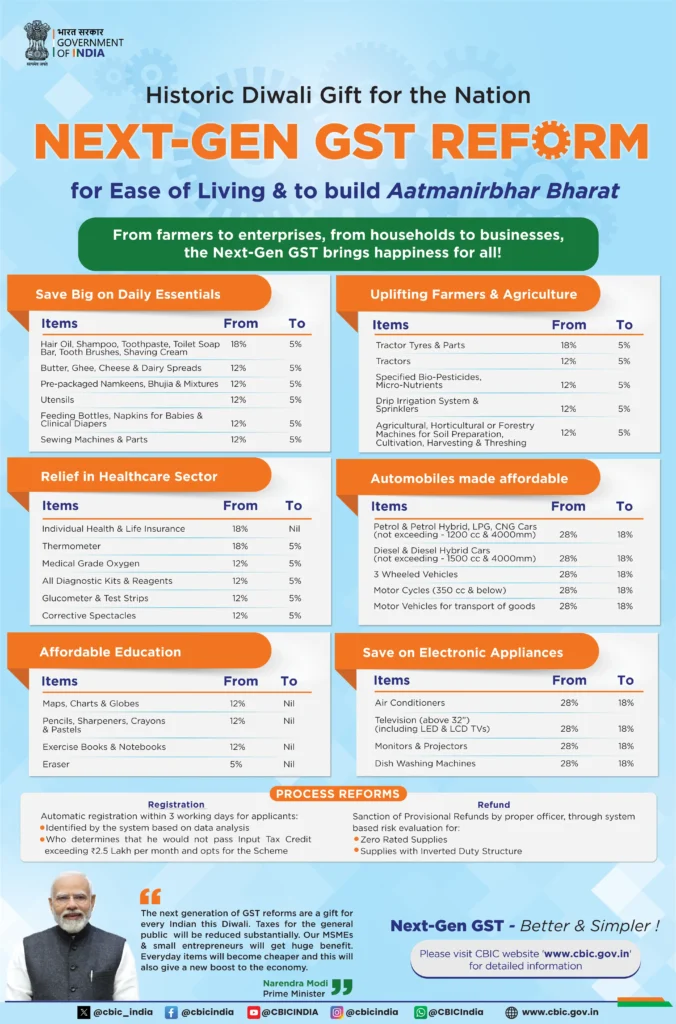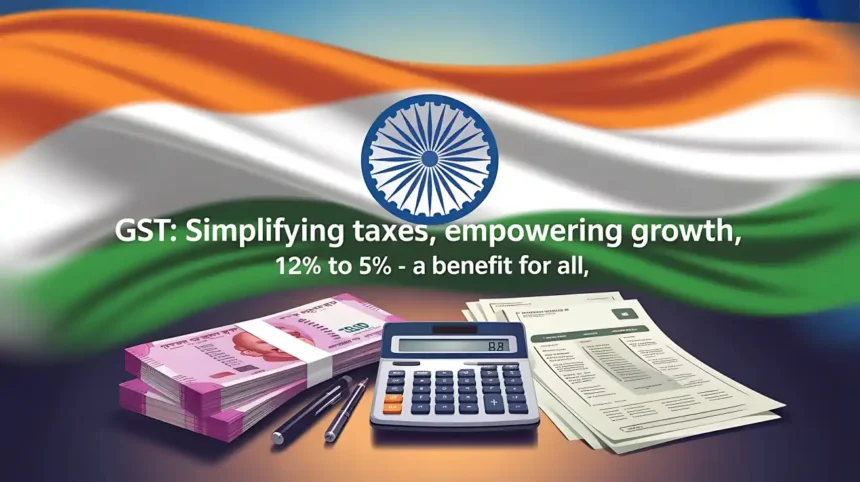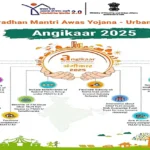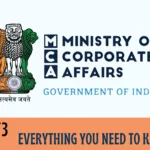The GST Council has cleared a sweeping “Next-generation GST” overhauling rates, procedures, and appeals—positioning it as a citizen-centric refresh that lowers the tax burden on daily essentials and speeds up refunds while simplifying compliance for small sellers. “Next-generation GST reforms… represent a strategic, principled, and citizen-centric evolution” of the system, the government said after the 56th Council meeting on September 3.
What’s changing—and when

Most rate changes on services and on goods (except tobacco and related products) kick in from September 22, 2025. Pan masala, gutkha, cigarettes, chewing tobacco, zarda, unmanufactured tobacco, and bidi will shift later to dates the Centre notifies after clearing compensation-cess loans; until then, existing rates continue.
The rate structure is being rationalised from four slabs to a “Simple Tax” with Standard 18% and Merit 5%, plus a special 40% for a narrow band of de-merit/luxury items (replacing the old GST+cess construct for many of them).
Comparative Table of GST Rate Changes (Old vs Next-Gen GST)
| Category/Item | Earlier GST Rate | Next-Gen GST Rate |
|---|---|---|
| Insurance (life, health, reinsurance) | 18% | 0% (Exempt) |
| Small cars (Petrol/LPG/CNG ≤1200cc & ≤4000mm; Diesel ≤1500cc & ≤4000mm) | 28% + cess | 18% |
| Mid/large cars & SUVs | 28% + cess (varied) | 40% (flat, no cess) |
| Three-wheelers, buses, trucks, ambulances | 28% + cess | 18% |
| Motorcycles ≤350cc | 28% + cess | 18% |
| Motorcycles >350cc | 28% + cess | 40% |
| Auto parts | 28% | 18% |
| Hair oil, soaps, shampoos, toothpaste, bicycles & parts | 12–18% | 5% |
| Indian breads (roti, paratha, parotta) | 5% | 0% |
| UHT milk | 5% | 0% |
| Packed foods (namkeens, sauces, pasta, noodles, chocolates, coffee, butter/ghee, cornflakes) | 12–18% | 5% |
| Medicines | 12% | 5% |
| Life-saving drugs (33+3 specified) | 5% | 0% |
| Medical devices | 12% | 5% |
| ACs, TVs (all sizes), dishwashers, cement | 28% | 18% |
| Hotel stays ≤₹7,500/night | 12% | 5% (no ITC) |
| Beauty & wellness services (gyms, salons, barbers, yoga) | 18% | 5% (no ITC) |
| Passenger transport by motor vehicle | 5% (no ITC) | 5% (no ITC) / 18% (with ITC) |
| GTA & container rail | 5% (no ITC) | 5% (no ITC) / 18% (with ITC) |
| Multimodal transport | 12% | 5% (restricted ITC) / 18% (air leg with ITC) |
| Textiles (MMF fibre/yarn) | 12–18% | 5% |
| Fertilisers (sulphuric/nitric acid, ammonia) | 18% | 5% |
| Renewable energy devices | 12% | 5% |
Highlights you’ll feel in your wallet
- Insurance gets a big Diwali-scale relief: All individual life and health insurance policies (including term, ULIP, endowment, family floater, senior-citizen plans) and their reinsurance are exempt from GST. Expect insurers to re-price premiums net of the 18% earlier applied.
- Autos: Small cars (petrol/LPG/CNG ≤1200cc & ≤4000mm; diesel ≤1500cc & ≤4000mm) drop to 18%; mid-size/large cars and SUVs move to a flat 40% with no cess; three-wheelers, buses, trucks, ambulances fall to 18%; motorcycles ≤350cc at 18%, >350cc at 40%; all auto parts at 18%.
- Everyday essentials: Hair oil, soaps, shampoos, toothbrush/paste, bicycles, and parts pared down to 5% (from 12–18% earlier). All Indian breads (roti/chapati, paratha, parotta) and UHT milk shift to 0%. Packed foods like namkeens, sauces, pasta, instant noodles, chocolates, coffee, butter/ghee, and cornflakes largely move to 5%. ACs, TVs (all sizes), dishwashers, cement slide to 18%. All medicines at 5% (except 33+3 life-saving drugs at 0%). Most medical devices are at 5%.
- Hotels & personal services: Hotel stays ≤₹7,500/night at 5% (no ITC). Beauty & physical well-being services (gyms, salons, barbers, yoga centres) at 5% (no ITC) from 18% earlier.
- Logistics: Passenger transport by motor vehicle retains 5% (no ITC) with an option for 18% with full ITC. GTA and container rail get similar 5% (no ITC) / 18% (with ITC) options; multimodal transport at 5% (restricted ITC) unless any leg is by air (then 18% with ITC).
Why this matters (the “tech” behind the tweak)
The government is collapsing slabs to minimise misclassification and reduce disputes, while merging erstwhile compensation-cess incidence into a transparent 40% special rate for a handful of de-merit/luxury items. For essentials (food, healthcare), rates are cut, but ITC (input tax credit) is preserved where needed to avoid supply-chain cost build-up. For instance, medicines and medical devices were put at 5%—not fully exempt—to prevent manufacturers from losing ITC and passing costs to patients, the FAQs explain.
On autos, the definition of SUVs is codified (engine >1500cc, length >4000mm, ground clearance ≥170mm) to curb ambiguity. Small cars get an across-the-board 18% to spur demand, while big cars standardise at 40% without cess, simplifying pricing.
On sin goods, the regime also moves tobacco & pan masala to retail-sale-price (RSP) based valuation when their transition happens—tightening revenue protection and compliance.
Broader implications for industry
- Insurers & hospitals: GST-free retail premiums can expand coverage; providers should recalibrate premium tables and IT systems before September 22.
- Auto OEMs & dealers: Re-label price lists; check model fitment against the SUV criteria and new motorcycle thresholds; uniform 18% on parts simplifies supply chains.
- FMCG & retail: Deep cuts on staples and personal-care SKUs can drive mix shifts; watch pass-through and promo strategies.
- Textiles, fertilisers, renewables: Inverted duty structures are corrected (MMF fibre/yarn to 5%; sulphuric/nitric acid & ammonia to 5%; renewable devices to 5%), with faster refunds promised—easing working capital.
- Disputes & certainty: The GSTAT will accept appeals by the end of September and start hearings by the end of December 2025; the Principal Bench doubles as the National AAAR. Quote: “The Goods and Services Tax Appellate Tribunal… will be made operational for accepting appeals before the end of September and will commence hearing before the end of December this year.”
Compliance upgrades and protective measures (do this now)
- Mark your calendar
- Sep 22, 2025: New rates for services + most goods go live. Tobacco/pan masala/cigarettes shift later by notification.
- Update systems & contracts
- Re-configure POS/ERP tax codes, price stickers, and HSN mappings (see Annexures for HSN-wise changes). If your output becomes exempt after Sep 22, reverse ineligible ITC on supplies made on/after that date; pre-change ITC remains usable for liabilities up to Sep 21. E-way bills in transit need no cancellation.
- Leverage faster refunds
- Risk-based provisional refunds (90%) for zero-rated supplies and inverted-duty cases will be operationalised from Nov 1, 2025 (via rules/CBIC instructions), improving cash flows.
- Simplify registrations
- An optional simplified registration auto-approves low-risk applicants (and those self-assessing ≤₹2.5 lakh/month output tax to registered buyers) within three working days, from Nov 1, 2025—expected to benefit ~96% of new registrants. A separate scheme for small sellers on e-commerce has in-principle approval.
- Price & promo clarity
- Hotels ≤₹7,500/night and personal wellness services move to 5% without ITC; plan promotions knowing ITC is unavailable at that rate.
- Watch the fine print
- Post-sale discounts: Law tweaks will rely on credit notes under Section 34 with corresponding ITC reversals by recipients where value is reduced, replacing pre-existing contract-linkage conditions; clarificatory circulars are planned.
- Final force of law follows notifications and amendments; the press note is an easy-read summary.
The bottom line
The package tilts prices of essentials down, big-ticket luxuries up, and paperwork lighter for small businesses. For households, the marquee change is GST-free insurance; for industry, it’s fewer slabs, clearer auto definitions, quicker refunds, and an appellate pipeline finally opening. If you sell, buy, insure, drive, ship, or stay—there’s a chance to action this month.
Note
The FAQs also clarify mechanics like time-of-supply, IGST on imports (aligns to notified GST rates), and transitional ITC use—worth a read for your finance teams. [FAQ PDF]







